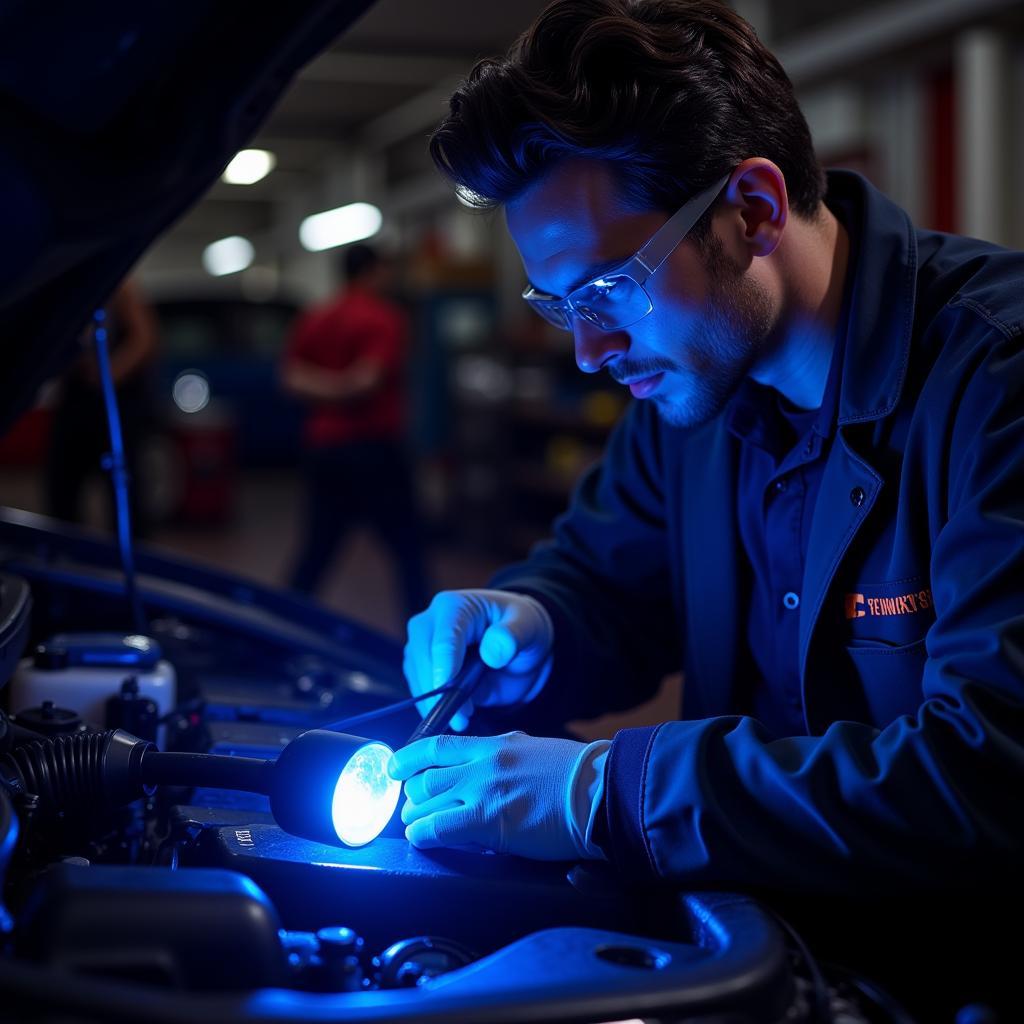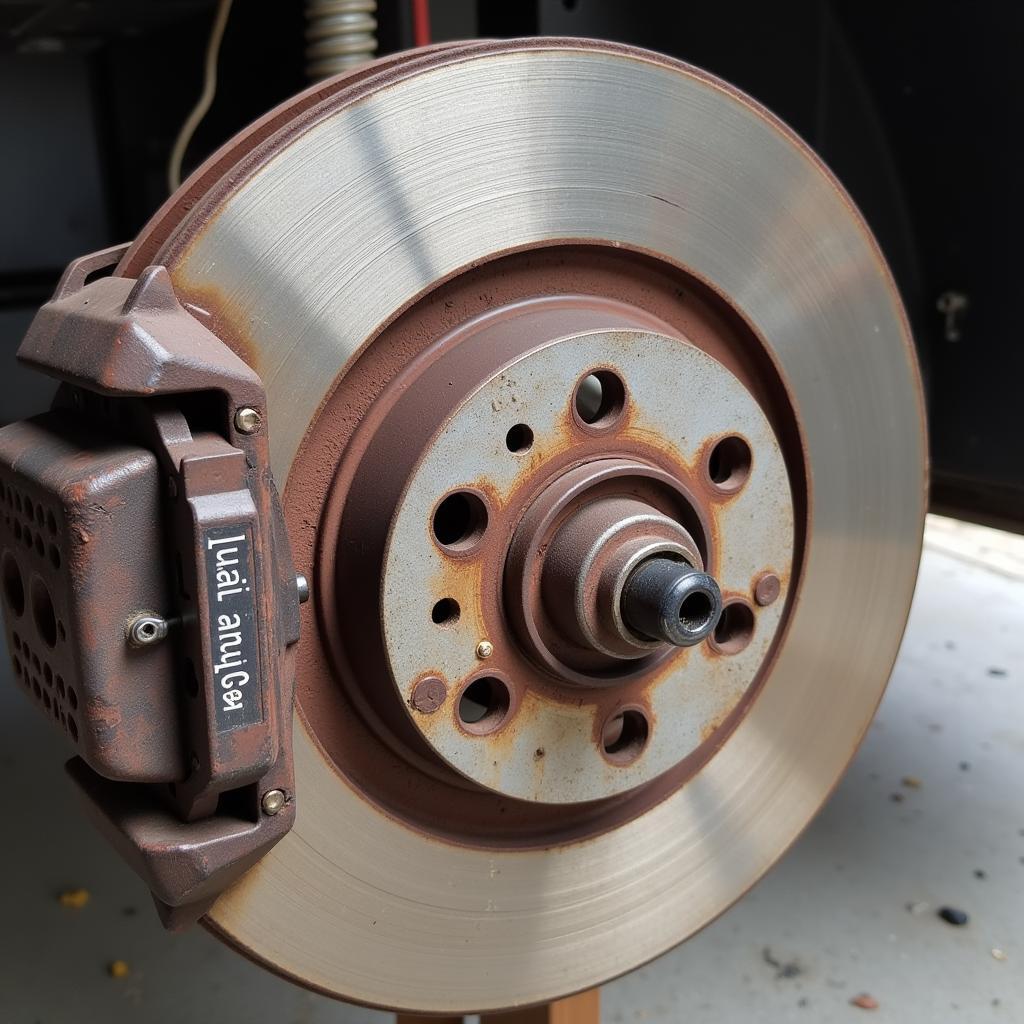A slow leak in your car’s AC can be a frustrating and expensive problem. Ignoring it will only lead to warmer air and eventually a completely non-functional AC system. This guide will teach you how to diagnose and fix a slow leak in your car AC, saving you money and keeping you cool. Learn about common causes, DIY solutions, and when to seek professional help.
One common culprit for slow leaks is a faulty seal or o-ring. These components can dry out and crack over time, allowing refrigerant to escape. Check our detailed guide on how to fix refrigerant leak in ac in car for more information on this specific issue.
Identifying the Source of the Leak
Pinpointing the exact location of an AC leak can be tricky. A slow leak won’t leave obvious puddles, making it harder to visually identify. Here are some methods to help you locate the leak:
- UV Dye: This is one of the most effective methods. A special UV dye is added to the AC system, and a UV light is used to trace the leak.
- Electronic Leak Detector: These detectors are sensitive to refrigerant and can pinpoint even small leaks.
- Soap and Water: A simple solution of soapy water applied to potential leak points can reveal bubbles if refrigerant is escaping.
- Pressure Test: A pressure test involves pressurizing the system with nitrogen and monitoring for pressure drops, indicating a leak.
 Car AC Leak Detection with UV Dye
Car AC Leak Detection with UV Dye
Common Leak Points in Car AC
Several areas are more prone to leaks than others. Focusing your search on these areas can save you time and effort.
- AC Compressor: The compressor is the heart of the AC system, and seals around it can fail.
- Condenser: Located at the front of the car, the condenser is susceptible to damage from road debris.
- Evaporator: The evaporator is located inside the dashboard and can be difficult to access.
- Hoses and Connections: Hoses and connections throughout the system can develop leaks due to vibration and wear. You can learn more about fixing hose leaks at fixing car ac hose leaks.
DIY Fixes for Slow Leaks
Some minor leaks can be addressed with DIY solutions. However, if you’re not comfortable working with car AC systems, it’s best to consult a professional. For more comprehensive guidance on DIY repairs, refer to our guide on how to fix leak in car ac system.
- Sealant: AC sealants can sometimes temporarily seal small leaks. However, they are not a permanent solution and can potentially damage the system if used incorrectly.
- O-ring Replacement: If you identify a leaky o-ring, replacing it is a relatively straightforward task.
- Hose Repair: Minor hose leaks can be repaired with specialized tape or sealant. However, severely damaged hoses should be replaced. You might find our guide on how to fix leaking ac in car helpful in this situation.
When to Call a Professional
While some minor repairs can be done at home, more complex leaks require professional expertise. If you are unsure about the source of the leak or uncomfortable working with the AC system, it’s best to consult a qualified technician. They have the specialized tools and knowledge to diagnose and repair even the most challenging AC problems.
How can I prevent future AC leaks?
Regular maintenance, including inspections and timely repairs, can significantly reduce the risk of future leaks.
Conclusion
Fixing a slow leak in your car AC is crucial to maintaining a comfortable driving experience. By understanding the common causes and utilizing the methods outlined in this guide, you can effectively address the issue. Remember, early detection and prompt action can prevent further damage and costly repairs. For more detailed information or assistance with your car AC issues, don’t hesitate to contact AutoTipPro at +1 (641) 206-8880 or visit our office at 500 N St Mary’s St, San Antonio, TX 78205, United States. We’re here to help you keep cool on the road! You can also check out our guide on how to fix ac car leak for more general advice.





Leave a Reply